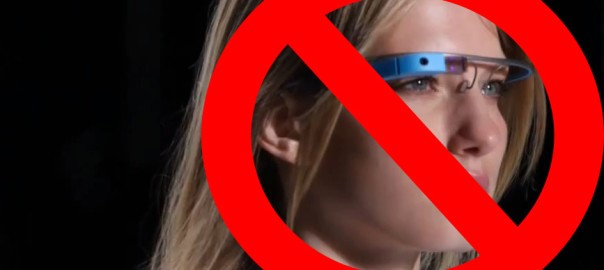
“I’m sorry, but we don’t allow iPhones in here. They allow people to take and share pictures with their phones, and that’s creepy.”
Looking around at the ubiquitous nature of web-enabled camera phones, you might think that’s ridiculous. And yet, we’re seeing exactly that sort of behavior pop up in some places regarding Google Glass.
Now, while most of these so-called “preemptive bans” are likely nothing more than small businesses grabbing a little media attention with a popular topic, some businesses are really taking a hard line stance. 5 Points Cafe owner David Meinert achieved some notoriety when he issued the first preemptive ban, stating:
”[Our patrons]…definitely, don’t want to be secretly filmed or videotaped and immediately put on the internet.”
This statement aligns with many of the voices calling for bans in public places, in that it does two things: it assumes nefarious usage, and it assumes that this is some new functionality. Neither is a valid assumption.
First things first: Glass does not provide ANY enhanced surveillance technology that is not currently present on every web-enabled camera phone on the market. It does not run all the time, only snaps pics and videos when instructed to, and has a visible LED indicator showing when that function is engaged. In fact, given that the LED indicator is at eye level, it’s more obvious when you’re using it than when you’re holding your camera phone at waist level snapping pics or video. Secondly, Glass users are (as a whole) not drooling perverts seeking to secretly share your love of Appletinis all over the interwebz; at least, not any more than all of your current friends who snap you at parties and instantly share to Facebook. But see, once again, that’s the point: nothing about sharing with Glass is any different than currently common technology; it simply puts it into a hands-free form factor, with a user interface slimmed down to work with a small screen, and enhanced voice/search capabilities.
Here’s the thing: like it or not, wearable technology is the next wave, and Google has taken the leap of faith needed to start our movement in that direction. While paradigm shifts are rarely without bumps and scrapes, allowing rampant paranoia about a new technology to dictate your business practices isn’t just bad for your bottom line; it’s silly. If you have a patron who’s interrupting everyone having dinner with an obnoxiously loud cell phone conversation, you don’t ban cell phones, you ban the boor. I, for one, can’t wait until they’re so common that we see first hand how ridiculous all of this noise really was.
